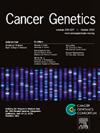64.用 OmniSeq® INSIGHT 在一名结直肠腺癌患者身上罕见地发现三重 KRAS 突变
IF 1.4
4区 医学
Q4 GENETICS & HEREDITY
引用次数: 0
摘要
背景直肠癌(CRC)在全球新发肿瘤病例中排名第三,是癌症相关死亡的第二大原因(PMID: 30207593)。KRAS 是 CRC 中最常发生突变的癌基因之一,约 40% 的患者携带 KRAS 激活错义突变(PMID: 31972237)。与 KRAS 野生型 CRC 患者相比,KRAS 突变型 CRC 患者的预后较差 [PMID:20008640;PMID:28453697]。在此,我们报告了在一名微卫星稳定型结直肠腺癌患者中同时发现三个具有临床意义的 KRAS 突变的罕见病例。方法在一家经 CAP/CLIA 和 NYS CLEP 认证的参考实验室,使用 OmniSeq® INSIGHT 测试 (PMID: 34855780),对一位 80 岁晚期结直肠腺癌患者的血液结肠切除标本进行了全面的基因组和免疫分析 (CGIP)。OmniSeq INSIGHT 是一种基于下一代测序的实验室开发的 DNA 和 RNA 检测方法,用于检测福尔马林固定石蜡包埋(FFPE)肿瘤组织中的基因组和转录组变异。G>A p.G12D、c.38G>A p.G13D和c.351A>T p.K117N),其VAF分别为10.1%、9.5%和4.1%。这三种突变都与西妥昔单抗和帕尼单抗靶向疗法的耐药性有关。此外,利用测序技术还能发现 G12D 和 G13D 突变发生在不同的细胞克隆/群体中。此外,CGIP 还能区分等位基因特异性 KRAS 突变和肿瘤亚克隆群体。本文章由计算机程序翻译,如有差异,请以英文原文为准。
64. A rare finding of triple KRAS mutations with OmniSeq® INSIGHT in a patient with colorectal adenocarcinoma
Background
Colorectal cancer (CRC) ranks third in terms of new tumor cases and the second leading cause of cancer-related death worldwide (PMID: 30207593). KRAS is one of the most frequently mutated oncogenes in CRC, with approximately 40% of patients harboring activating missense mutations in KRAS (PMID: 31972237). Patients with KRAS-mutant CRC have a worse prognosis than those with KRAS wild-type CRC [PMID: 20008640; PMID: 28453697). Here we report a rare finding of three clinically significant KRAS mutations co-occurring in a patient with microsatellite stable colorectal adenocarcinoma.
Methods
Comprehensive genomic and immune profiling (CGIP) was performed on a hemicolectomy specimen from a >80 year old patient with advanced colorectal adenocarcinoma with 60% tumor nuclei and more than 1000 neoplastic cells per slide at a CAP/CLIA and NYS CLEP certified reference laboratory with the OmniSeq® INSIGHT test (PMID: 34855780). OmniSeq INSIGHT is a next generation sequencing-based laboratory developed test for both DNA and RNA for the detection of genomic and transcriptomic variants, in formalin-fixed paraffin-embedded (FFPE) tumor tissue.
Results
We identified three co-occurring KRAS mutations (c.35G>A p.G12D, c.38G>A p.G13D and c.351A>T p.K117N) with VAF 10.1%, 9.5% and 4.1% respectively in the same colorectal adenocarcinoma patient specimen. All three mutations are associated with resistance to targeted therapies with cetuximab and panitumumab. In addition, the sequencing utilized was able to reveal that G12D and G13D mutations occurred in different cell clones/populations.
Conclusions
CGIP revealed three distinct KRAS co-mutations at known KRAS hot-spots. In addition, CGIP can distinguish allele-specific KRAS mutations and tumoral sub-clonal populations.
求助全文
通过发布文献求助,成功后即可免费获取论文全文。
去求助
来源期刊

Cancer Genetics
ONCOLOGY-GENETICS & HEREDITY
CiteScore
3.20
自引率
5.30%
发文量
167
审稿时长
27 days
期刊介绍:
The aim of Cancer Genetics is to publish high quality scientific papers on the cellular, genetic and molecular aspects of cancer, including cancer predisposition and clinical diagnostic applications. Specific areas of interest include descriptions of new chromosomal, molecular or epigenetic alterations in benign and malignant diseases; novel laboratory approaches for identification and characterization of chromosomal rearrangements or genomic alterations in cancer cells; correlation of genetic changes with pathology and clinical presentation; and the molecular genetics of cancer predisposition. To reach a basic science and clinical multidisciplinary audience, we welcome original full-length articles, reviews, meeting summaries, brief reports, and letters to the editor.
 求助内容:
求助内容: 应助结果提醒方式:
应助结果提醒方式:


